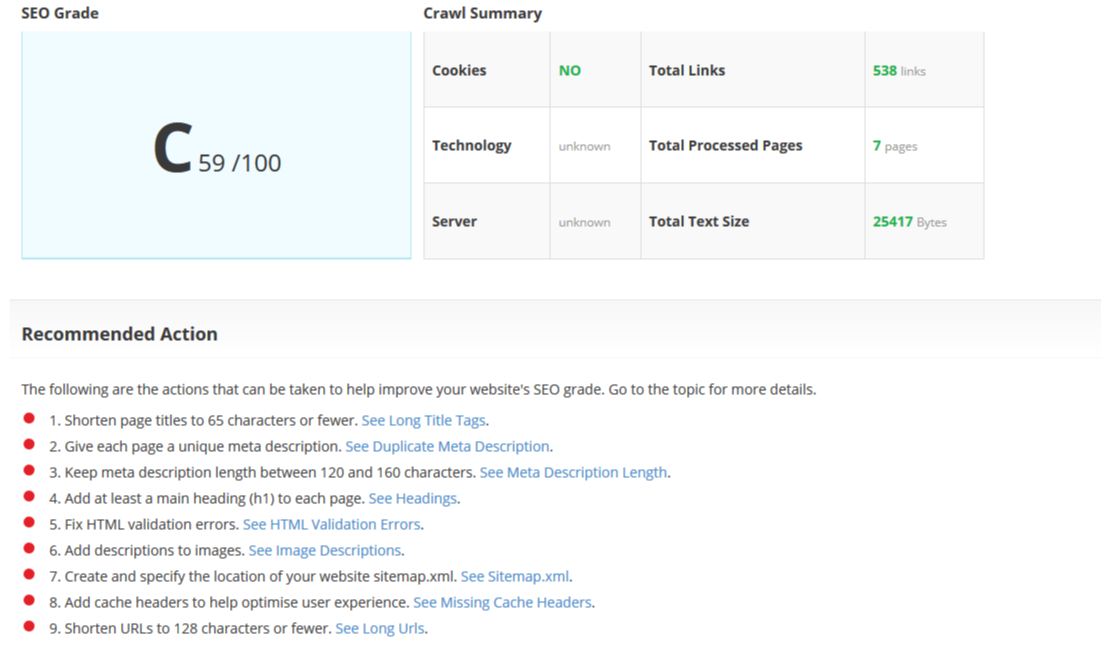What is a website audit?
A website audit gives you the complete analysis of everything that affects or is related to your website’s search visibility. The key purpose of a website audit is to spot and fine tune/fix issues related to SEO and content marketing. From understanding why your website has a sudden spike in its bounce rate, or isn’t generating the traffic that you aim to get, to why it’s failing to get the desired level of conversions for you, a website audit can answer these and many more questions that would help you plan your strategies better and implement them to achieve your goals.
Though different types of website audits are done, here are the key ones related to SEO needs:
- Website Health Audit: This evaluates your website’s overall health and draws attention to problems or issues (like a drop in traffic or too slow loading of a page etc) that need to be handled immediately.
- Competitive Website Audit: From detecting the pros and cons of your competitors to monitoring all drawbacks and growth opportunities for your website promotion, this audit does it all.
- Red Flag Audits: This involves assessing a site for probable penalty issues. This may either be a separate audit or a part of your site’s health audit.
- Security Audits: This is about analyzing your site’s potential vulnerability issues, especially where your site is a high-value one, or you deal in high-risk verticals.
- Conversion Optimization Audits: This involves evaluating a site’s conversion issues, which could be technical or onsite.
Why you need an SEO Audit?
Since SEO procedures and best practices undergo changes quite often, you need to perform periodic assessment of your website to decide if any adjustments are required to be made. In case you fail to do it and your website isn’t search engine optimized, you would miss out on a significant chunk of traffic from the search engines, which would include a sizable amount from your potential customers.
An SEO audit can be segmented into five broad categories:
- Accessibility
- Indexability
- On-Page SEO
- Off-Page SEO
- Competitive Analysis
Accessibility audit evaluates if your webpages are accessed properly by search engine crawlers, after which they are checked against the indexed pages (under indexability). You can use the “site:” command on Google to get a rough estimate of the number of indexed pages of that site. In case your website is crawled by the search engine crawlers but some of your pages aren’t getting indexed, you should be worried. Some common reasons that may cause such problems include:
- Incorrect configuration of the .htaccess file
- search engine crawlers being blocked by the robots.txt file
- Incorrect configuration of URL parameters
- Presence of a <noindex> attribute in your metatags
- Some DNS problems in your server
From evaluating page URLs (with respect to user-friendliness, use of relevant keywords etc), meta descriptions and page titles, to checking content of the site (by assessing the site’s information architecture, keyword cannibalism and duplicate content), image ALT tags and filenames, as well as outlinks (whether they point to reputed and reliable sites, use unnecessary redirection, are broken etc), a close look is taken at several important on-page ranking factors (under on-page SEO) that are crucial for your website.
Ranking factors generated by external sources (off-page SEO) like popularity (which includes getting backlinks from popular sites), trustworthiness (by assessing spammy behavior like keyword stuffing, cloaking, making text hidden/invisible), site authority and social engagement too are emphasized upon in SEO audit.
The last step is performing all these steps mentioned above once again for analyzing your website’s competitors (under competitive analysis) to know more about them, pick some information that can work well for your business too, and identify (as well as exploit) your competitors’ weaknesses.
Tools To Help With SEO And Website Audits
There are many quality SEO Audit tools (such as SEOAnalytix.com) that can be used to perform SEO and Website Audits. It is crucial to use such a tool so that your SEO work is effective and efficient.



